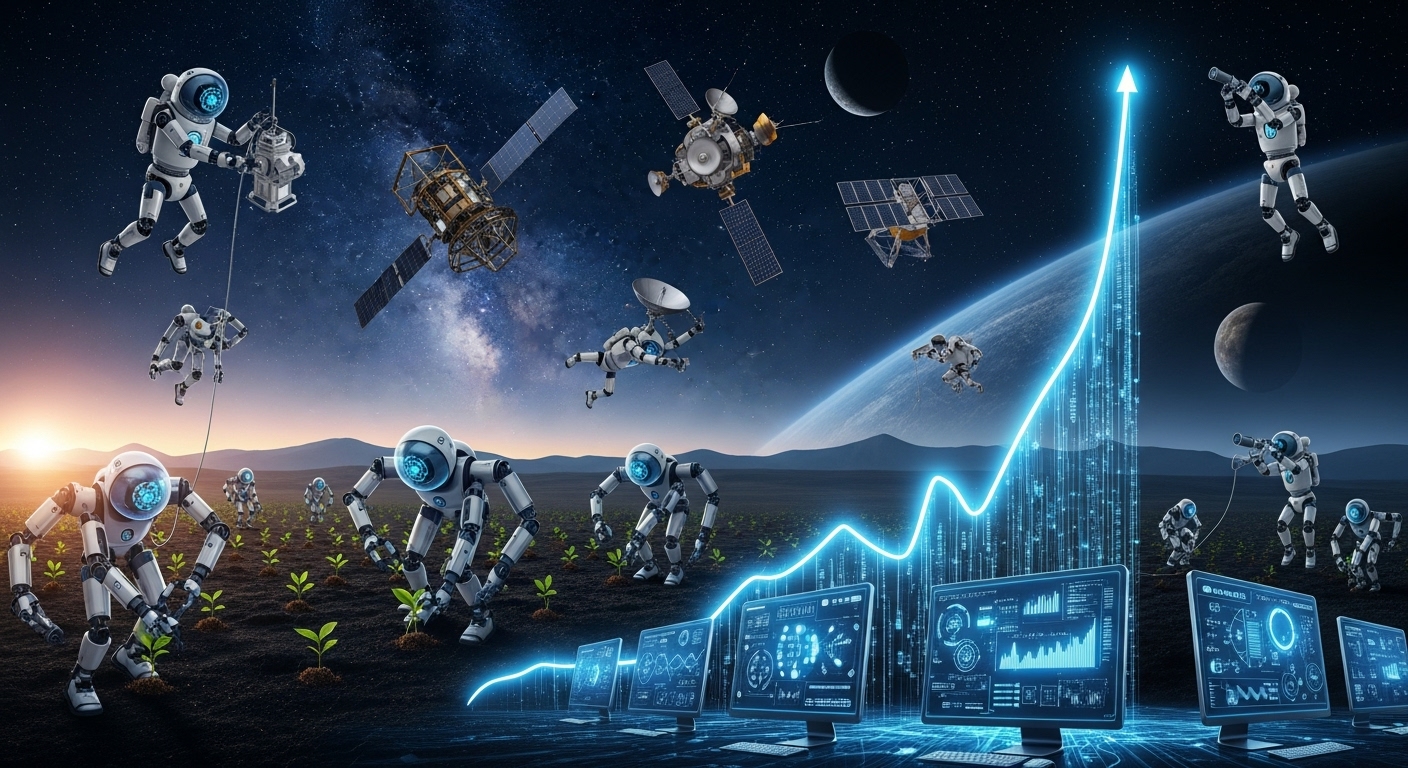More About the Knowledge Tier System

The Fermi Paradox
The Fermi paradox is a fairly immediate consequence of assuming
- Humans evolved at a typical time for intelligent life in the galaxy – not too early, not too late.
- Sufficiently advanced civilizations will send out self-replicating robots to study and possibly transform other star systems.
Assumption 1 seems reasonable to suppose. Here’s the reasoning behind assumption 2:
Consider human civilization. How likely do you think it is that we’ll have developed sufficiently-advanced AI-enabled robots that can
- find materials in space rocks to self-replicate
- self-replicate in space.
- survive a trip through space from one star system to another.
Most people who consider this, think it’s very likely within a couple centuries. My intuition is that it will be possible within a century.
If you’re thinking this sounds a bit too fantastic to happen in the real world, I want you to consider an analogy with the current AI situation. A lot of people, including some of the people who are actively working on developing ever-more-powerful AI are worried about its safety. People have proposed a “temporary ban” on AI development, but what happens in the real world? The forces of capitalism and competition are basically making that nearly an impossibility. Now, think about what happens when the first self-replicating robot is launched into space. Whoever is the first, has a head start in using the raw materials of the solar system to build an exponentially-growing army of space-based robots. After going through ~40 iterations of self-replication, the army of robots could number in the trillions! This could take a while – maybe even more than a century – but there probably will be an arms race to see who can develop the fastest-growing army of space-robots.
Once a star system has trillions of self-replicating robots, sparing a few billion to head to all of the nearest stars (with several robots each, for redundancy) would be a trifle.
Traveling at \(\approx 0.001c = 300km/s\), a probe could probably be engineered pretty much within current technology to withstand the interstellar trip. This is just to show that building a rocket a couple dozen times faster than the New Horizons probe, which is certainly thought physically possible with a bit more physics and engineering, we could make a probe that would reach a nearby star within a dozen millennia.
Another point to consider is that once you have trillions of these robots, if they’re not entirely useless, you’ll probably be able to coordinate them for all kinds of massive engineering projects. Some of those projects could be massive on a scale we can hardly imagine. The physicist Freeman Dyson has proposed that there could be massive spheres built around stars that collect some or most of the light emitted by the stars. He suggested we’d be able to detect such structures as sources of infrared light, but little visible light.
Even if it’s not something quite so grand, there could be some truly gigantic structures that might be built – like the pyramids – just to be highly visible. So it looks like we could be capable of building grand structures that might be detectable with our current technology across the galaxy, if our modern civilization is allowed to progress for the next hundred years or so. Maybe it will take two hundred years.
Some Consequences
By now, hopefully you are convinced that our neighborhood of stars could be crawling with self-replicating robots within a few dozen millennia. If we run this thought experiment forward another 100 million years or so, we could have self-replicating robots around most of the stars on the galaxy. What this means, is that we could have detected a civilization like ours, if it had built such self-replicating robots a sufficiently long enough time ago.
Who knows? Maybe AI will one day help to spread life throughout the galaxy. Especially if, say, AI really comes to love botany, or something like that. This is all speculative, but it does show that there’s no reason to rule out these kinds of scenarios – where we’d be able to detect that a civilization like us arose before us. What this means, then, is that
There hasn’t been a civilization like us that evolved before us by more than 100 million years inside this galaxy.
Reason: the way this has been narrowly framed, we would have detected something by now, or seen some kind of mega structure.
Honestly, this isn’t a proof and shouldn’t be taken as such. It’s just an argument that I feel is highly plausible. It’s almost true by definition. I’ve narrowly defined civilizations like us to be ones that we’d be able to detect by now, if they had a 100 million year head start. It’s just a thought experiment.
Scientists at places like SETI (and elsewhere) have determined that life-supporting planetary systems around stars like ours could have been possible for at least several billion years before the earth had even formed. There has been plenty of time for any one of them that developed at least 100 million years before us to pepper the galaxy with robots that, as far as we can tell, have never existed.
The paradox is then, “where are they?”
Using the Tier System
I would classify the Fermi Paradox as a Tier 3 phenomenon. Scientists have persistently failed to detect any evidence of a civilization like ours having developed at least 100 million years ago. This is not what you would expect, if humans weren’t the first such civilization. This has also been termed the great silence.
This is the result of a thought experiment that has been performed by many people by now. It is not a Tier 1 or 2 scientific conclusion, though.
To sum it up so far
- Human civilization seems to be on the verge of “infecting” the universe with something that would behave like mechanical life.
- Thinking of it like this, it seems almost inevitable that this mechanical life will spread out across the galaxy, replicating itself and interacting with its environment wherever it goes.
- This activity should be obvious to us.
- Once this process gets started, like life on earth, it’s very difficult to imagine a way to stop it.
- Therefore, we really do seem to be the first civilization capable of achieving this. Why should we be first?
Possible Explanations
These are some of the proposed explanations (Tier 4)
- The earth is extremely rare, so life rarely gets a suitable habitat.
- There are a prohibitive number of hurdles life has to overcome in order to develop intelligence.
- There is an existential filter ahead of us, so that we’ll never get a chance to build self-replicating space robots.
A lot of people do not like 1 and 2, they tend to lean toward 3. However, I feel like it’s probably 1 and 2, and not 3, or at least it hasn’t played a dominant role.
Here’s why I lean away from 3 and toward 1 and 2, and especially toward 1.
Planets in the habitable zone might be common, but it could be that a planet with
- a large moon
- in a system with a large Jupiter-like planet
- nearly circular orbits that are stable
etc, etc… are incredibly rare. Maybe there’s a lot more that makes earth special. However, it does seem like another planet out there should have spawned life before us. How rare could earth possibly be? How rare are planet-planet impacts, like the one that formed the earth-moon system, and is there a reason to suspect such a scenario would be necessary? I think most people don’t think that. Perhaps our solar system is extremely rare in having had a very violent past, followed by a very unusual amount of stability.
Explanation 2 is similar – it’s difficult to evolve intelligence, even with the right habitat, so none of the stable habitats that came before earth managed to evolve an advanced civilization capable of making self-replicating space robots, etc… So, essentially, we humans are either one of the first, or perhaps the first in this galaxy.
However, this still leaves us asking, “why should we be the first in the galaxy?”
So, we might reasonably conclude that there’s a filter ahead of us – something that every sufficiently advanced civilization does that permanently disables their ability to create Von Neumann probes (The brilliant mathematician Von Neumann first thought about self-replicating space probes).
My main issue with this line of reasoning is
What is the mechanism?
It doesn’t make sense that it could be something like nuclear war. Because in order for this to be the universal filter it has to work for every civilization that progressed at least as far as we have (without destroying ourselves yet!). Furthermore, consider a planet like ours, but where one government runs the entire planet. It should be trivial for that government to keep the nuclear stockpile small. It would have no incentive to build a planet-destroying stockpile capable of doomsday scenarios. It doesn’t make sense as a universal filter.
Neither does climate change, which causes major disruptions, but doesn’t seem to possess a mechanism whereby it would disallow the construction of Von Neumann-type space probes by the remaining civilization.
Same with AI. In fact, an AI takeover might just speed up the process, especially if it happens at the right time.
I would say, that if the filter lies ahead of us (so that there have been many civilizations throughout the galaxy that have come before us, but all of them fell victim to the same fate), then we haven’t identified that filter (fate) yet.
As mentioned above, I consider this to be a Tier 3 persistent phenomenon, because of how poorly the Tier 4 explanations put forward so far do to explain it away.
Further Considerations
I’ve framed things slightly differently from how I’ve seen it handled by others. I’m specifically asking why we don’t see any signs of intelligence like us. Here’s why I don’t think that’s being overly restrictive.
First, even if other unrecognizable forms of intelligence evolve, it still leaves the question of why don’t we see any evidence of intelligent life like us? Why might we be the first to build mega structures like Dyson Spheres (or something else that could be detected from across the galaxy)? Why might we be the first to send out probes to all the other star systems? Humanity seems like a species that can’t keep itself from doing the things we’re looking for. Given enough time and development, it might not be possible to prevent Von Neumann probes.
Second, how do these other intelligences evolve? How do you go from not using tools to manipulate your environment like we do, to being “intelligent”? Are we looking for space squid? Only if they have advanced technology, right? Are we looking for something more mystical? How does that work? I’ll actually touch on some of these ideas, but I don’t understand how nature could evolve intelligence without something resembling a neuron. Otherwise, why wouldn’t life on earth have evolved it already? Why bother with all the mess of evolving tool-using primates?
This helps us avoid the pitfall of thinking that all the other intelligent life out there is completely unrecognizable to us. I find this very hard to believe. I feel like it’s the biggest unexplained mechanism so far.
We’ll (sometimes I still write “we”, but I often mean “you and I”, instead of the royal “we”) explore this idea a lot further in an upcoming post. I’ll even make it slightly mathematical.
Thank you for reading!!
[There’s no comment section so far, but feel free to reach out to me through the Contact Us page!]
